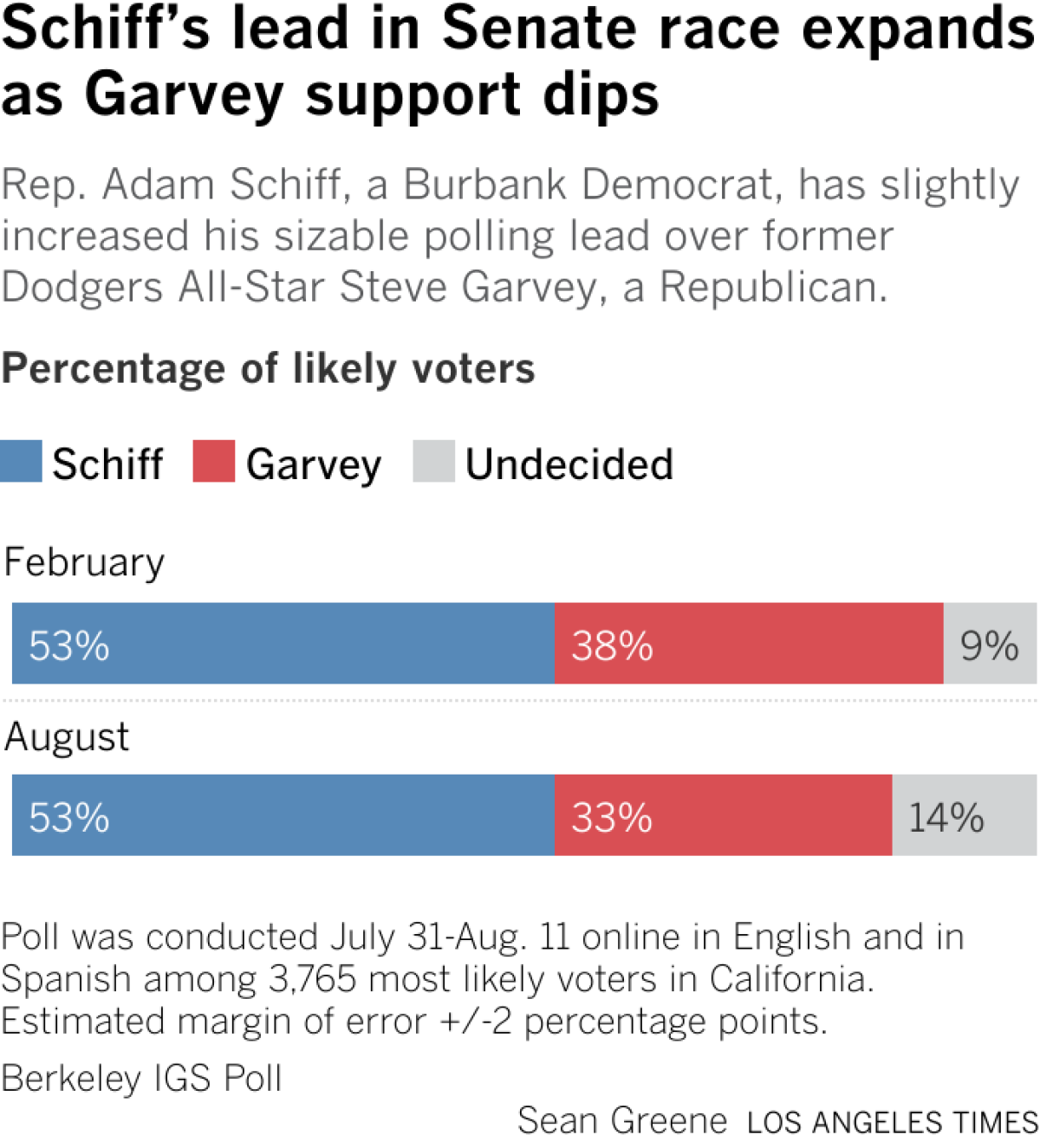Rep. Adam B. Schiff has slightly expanded his already sizable lead over retired Dodger All-Star Steve Garvey in new polling ahead of California’s U.S. Senate race, with the Burbank Democrat now holding a 20-point advantage over his Republican challenger.
Schiff was the preferred candidate of 53% of likely voters in the state, while Garvey was preferred by 33%, according to the UC Berkeley Institute of Governmental Studies poll, which was co-sponsored by the Los Angeles Times.
A Berkeley IGS poll of likely voters in February, prior to the state’s March primary, had Schiff leading 53% to 38% — 15 points — in a two-way matchup with Garvey, with 9% undecided. While Schiff’s support has remained stagnant, Garvey’s support dropped by 5 points and the number of undecided voters increased by the same amount, to 14%.
In a state where Democrats hold nearly a 2-to-1 advantage in voter registration, Schiff is considered an overwhelming favorite to take over the seat long held by the late Sen. Dianne Feinstein. After Feinstein’s death in September, Gov. Gavin Newsom appointed Sen. Laphonza Butler to temporarily fill the seat — which she did not seek to retain in the 2024 election.
Schiff’s campaign declined to comment on the polling. Andy Gharakhani, Garvey’s campaign manager, said in a statement that for Schiff to “only be at 53%” after “decades in politics” was “evidence enough that the momentum in this election is behind Steve Garvey.”
“While Adam Schiff has already spent tens of millions of dollars on advertising and is well defined with voters, Californians are listening to Steve Garvey with an open mind,” Gharakhani said.
Mark DiCamillo, the director of the Berkeley IGS poll, said the latest findings do not show a major shift among voters since February, which he did not find surprising. He and other analysts said the race was shaping up to be a fairly typical one for California — with voters choosing a candidate based on party loyalties, and few crossing party lines.
“The problem for Garvey is there are way more Democrats and liberals in the state than there are Republicans or conservatives,” DiCamillo said. “It’s a structural problem for the Republicans.”
Schiff and Garvey are going head to head after securing the most votes of all contenders in California’s unusual “jungle primary” in March, where the top two vote getters — regardless of party — advanced to the general election.
Schiff beat out Reps. Katie Porter of Irvine and Barbara Lee of Oakland in the primary. He spent millions of dollars on ads casting the race as one between him and Garvey, rather than between him and his fellow Democrats. That framing was credited with raising Garvey’s profile — and vote count — while boxing out his liberal challengers and easing his own path to a general election victory.
Among registered Democrats, 84% preferred Schiff, while 5% preferred Garvey, the poll found. Among registered Republicans, 88% favored Garvey, while 3% preferred Schiff, the poll found.
Among unaffiliated voters, 54% preferred Schiff, 25% preferred Garvey and 21% were undecided.
More than half of voters — 52% — said it was very important to them to have a candidate who “would be a strong voice in defending abortion rights in the Senate,” which appeared to be drawing voters to Schiff. While 84% of Schiff voters felt that way, just 8% of Garvey voters did. Backers of Garvey were much more likely, meanwhile, to say it was important to have a candidate who “supports tougher immigration laws.”
Schiff has said access to safe abortion care is a right and should be guaranteed nationally, while Garvey has said he personally opposes abortion but would support the “voice” of Californians on the issue. Both Schiff and Garvey have called for comprehensive immigration reform. Schiff has focused in part on calling for a “pathway to citizenship” for undocumented immigrants — including those brought here as children — while Garvey has largely focused on securing the border and rewarding “good actors” who have followed existing naturalization rules.
DiCamillo said Schiff can feel pretty good about the latest numbers. “If over 80% of the Democrats are in his camp, that’s a pretty good position to be in,” he said.
In California, DiCamillo said, “the coast dominates,” with most voters living in a county that touches either the Pacific Ocean or San Francisco Bay. And Schiff is dominating there.
Schiff’s lead is most pronounced in the nine counties that comprise the Bay Area, where he is preferred by 67% of likely voters, compared to 21% for Garvey. In Los Angeles County, home to Schiff — and a quarter of California’s registered voters — Schiff is up 53% to 29%. Garvey performs best in the Inland Empire and the Central Valley, where he is running about even with Schiff.
Gharakhani, Garvey’s campaign manager, said Garvey has an untapped “war chest” of millions of dollars that he is preparing to use to “communicate his message of common sense, compassion, and consensus building directly to voters,” and that “a lot can happen in the next three months.”
Gharakhani pointed to Garvey outperforming Schiff in fundraising in the second quarter of this year. However, Schiff had nearly double the cash on hand as Garvey — about $6.5 million compared to $3.3 million — at the end of June, according to campaign finance reports.
The Berkeley IGS poll, conducted online in English and Spanish between July 31 and Aug. 11, surveyed 3,765 registered California voters considered likely to vote in November. The margin of error was estimated at 2 percentage points in either direction, but may be imprecise given results were weighted to match census and voter registration benchmarks.
